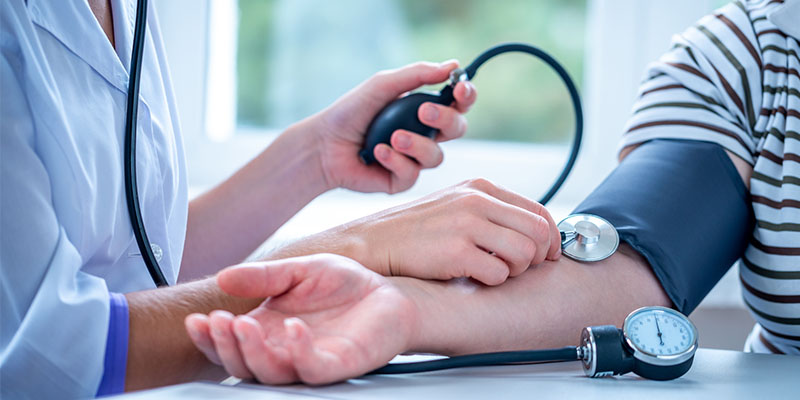


Hypothyroidism and high blood pressure are two common health conditions that can affect anyone, regardless of age or gender. Hypothyroidism is a condition in which the thyroid gland doesn’t produce enough thyroid hormone, while high blood pressure is a condition in which the force of blood against the artery walls is too high. While these two conditions can occur independently, research has shown that they are often linked. In this article, we will delve into the relationship between hypothyroidism and high blood pressure in greater detail, including their causes, symptoms, diagnosis, and treatment options.
There are several possible causes of hypothyroidism, including Hashimoto’s thyroiditis, a condition in which the immune system attacks the thyroid gland, and thyroid surgery or radiation therapy. Other factors that can contribute to hypothyroidism include certain medications, iodine deficiency, and congenital hypothyroidism.
High blood pressure, on the other hand, can be caused by a range of factors, including genetics, obesity, a sedentary lifestyle, and a diet high in salt or unhealthy fats. In some cases, medications such as NSAIDs and corticosteroids can also contribute to high blood pressure.

Research has shown that hypothyroidism can contribute to high blood pressure by affecting the body’s ability to regulate blood pressure. The thyroid gland produces hormones that play a crucial role in regulating the body’s metabolism, including the way it handles salt and water. When the thyroid gland is not producing enough hormones, it can lead to an imbalance in the body’s salt and water levels, which can cause blood pressure to increase.
The symptoms of hypothyroidism can vary depending on the severity of the condition. Common symptoms include fatigue, weight gain, cold intolerance, constipation, and dry skin. In more severe cases, symptoms can include depression, slowed heart rate, and memory problems.
High blood pressure may not cause any symptoms at first, but over time, it can cause significant damage to the body. Some common symptoms of high blood pressure include headaches, dizziness, blurred vision, chest pain, and shortness of breath. If left untreated, high blood pressure can lead to more severe complications, such as heart attack, stroke, and kidney disease.
Diagnosing hypothyroidism typically involves a physical exam, blood tests to check thyroid hormone levels, and possibly a thyroid ultrasound or biopsy. The blood test measures the levels of thyroid-stimulating hormone (TSH) and thyroid hormones T3 and T4 in the blood. If a person has symptoms of high blood pressure, their doctor may measure their blood pressure during a routine exam or recommend a 24-hour blood pressure monitoring test to get a more accurate reading.
The treatment of hypothyroidism typically involves hormone replacement therapy, in which a person takes synthetic thyroid hormone to replace the hormone their body is not producing. This medication is usually taken for life and must be carefully monitored by a doctor to ensure that the person is taking the correct dosage.
The treatment of high blood pressure typically involves lifestyle changes, such as a healthy diet, regular exercise, and stress management techniques. If lifestyle changes are not enough, a person may need to take medication to lower their blood pressure. There are several different types of medications used to treat high blood pressure, including diuretics, ACE inhibitors, and calcium channel blockers.
While some factors that contribute to hypothyroidism and high blood pressure may be out of a person’s control, there are steps they can take to prevent these conditions. Eating a healthy diet rich in fruits, vegetables, whole grains, and lean protein can help maintain a healthy weight and reduce the risk of developing high blood pressure. Consuming iodized salt and seafood can help prevent iodine deficiency, which can contribute to hypothyroidism. Regular exercise, stress management, and avoiding smoking and excessive alcohol consumption can also help reduce the risk of developing these conditions.
If left untreated or poorly managed, hypothyroidism and high blood pressure can lead to serious complications. Hypothyroidism can lead to an enlarged thyroid gland (goiter), infertility, heart disease, and nerve damage. High blood pressure can cause damage to blood vessels and organs such as the heart, kidneys, and brain, increasing the risk of heart attack, stroke, and kidney disease. It’s important to work with a healthcare provider to manage these conditions and prevent or minimize the risk of complications.
If a person has both hypothyroidism and high blood pressure, it’s essential to understand how medications for these conditions may interact. For example, some medications used to treat high blood pressure, such as beta-blockers, can lower the heart rate and may interact with thyroid hormone replacement therapy. It’s important to inform healthcare providers of all medications and supplements a person is taking to avoid potentially harmful interactions.
Hypothyroidism and high blood pressure are two common health conditions. It can be linked, and it’s important to understand the causes, symptoms, diagnosis, and treatment options for both conditions. Hypothyroidism can contribute to high blood pressure by affecting the body’s ability to regulate blood pressure, and the symptoms of both conditions can be similar. Diagnosing hypothyroidism typically involves blood tests to check thyroid hormone levels, while diagnosing high blood pressure involves measuring blood pressure during a routine exam or a 24-hour monitoring test. Treatment for hypothyroidism involves hormone replacement therapy, while treatment for high blood pressure may involve lifestyle changes and medication. It’s important for anyone with symptoms of either condition to speak with their doctor and get an accurate diagnosis and appropriate treatment to manage their health effectively.
Read Also:
Unusual Symptoms Of Diabetes: Signs You Shouldn’t Ignore
Does Smoking Lower Testosterone? The Effects of Smoking on Men’s Hormonal Health
Calcium Rich Foods for Pregnancy: The Ultimate Guide